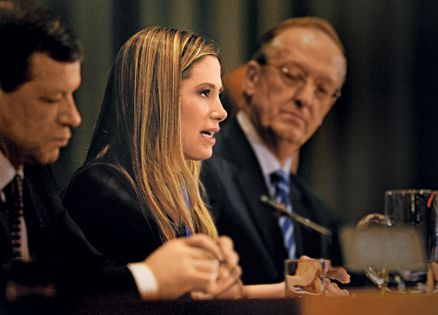When you look into the eyes of someone who’s had all their basic human rights stolen, their dignity stripped away, treated like an object, not a human being, how can you turn your back? How can you not speak out, and act?
I was raised in a family where standing up for people who are mistreated or oppressed was expected. My mom marched with Dr. Martin Luther King, Jr., before I was born, and always worked to relieve suffering. My father also considered Dr. King his hero, along with the great Archbishop Desmond Tutu.
At 10, I was profoundly influenced by the Diary of Anne Frank, and the horrendous stain on humanity’s conscience that was the Holocaust. In Beijing, as I worked on my college degree, I was struck by the racial violence between Chinese and African students, and wrote my thesis searching for causes of this conflict.
I wanted to understand what gave rise to one human being’s ability to see another as somehow less human. Eventually I became an actor, like my father, Paul Sorvino, but I always sought to fight for just causes.
In 2004 I was given my chance. Just as I learned I was carrying our first baby girl, Amnesty International asked me to be their Stop Violence Against Women campaign spokesperson. Didn’t I have the responsibility to make the world a better place for my daughter and girls everywhere?
One of the topics we focused on was human trafficking: slavery—something I assumed had disappeared in the nineteenth century.
I was shocked to discover a huge, booming, illegal international trade in men, women and children. Impoverished people seeking a better life are tricked into slave labor; others are kidnapped or sold by their own families; children are forced into sexual slavery.
The statistics appall. Human trafficking grosses 32 billion dollars a year. The only criminal activity in the world that’s bigger is drug trafficking.
Then I was offered a role in the miniseries Human Trafficking. That’s when my investigation of this scourge began in earnest. I grilled members of law enforcement; I interviewed trafficking survivors and aid workers.
In 2009 I was sworn in by the United Nations as Goodwill Ambassador to Combat Human Trafficking, as I awaited the birth of my third child (pregnancy and activism seem to agree with each other!).
My knowledge and efforts to be a better victim’s advocate grew exponentially. But one event really cemented my commitment to this fight.
I flew down to Mexico City with the UN’s antitrafficking effort. We were then taken to an after-care center that helps girls rescued from sexual slavery. We drove through big gates past a green lawn.
We saw a group of mostly adolescent girls standing on steps in front of the main house, smiling shyly. Some little ones swirled around their knees. I thought, Can’t be. They must be daughters or sisters of the older ones.
We went upstairs to a large, bright room. Girls congregated on sofas, eager to be met but nervous to speak. A little girl, around three and a half feet tall, approached me, holding out papers. Her mouth was open in a smile; her front baby teeth were out, and the new ones had not grown in yet.
She handed me her addition and subtraction problems on lined paper. A staffer whispered, “We rescued her four months ago. Her father killed her mother in front of her when she was three, then relatives sold her to a brothel for tourists, where she worked from age four to seven.”
When the child was asked what things she had been made to do, she did not even know how to describe them. All she could say was, “Incorrectos.”
My heart was breaking. Here stood a seven-year-old with shining eyes, proud of her arithmetic. I saw flashes of my own daughter. I asked her what she liked to do; she told me dancing. She showed me steps her teacher had taught her; I shared iPhone pictures of my daughter’s ballet class. But inside I was dying.
I soon learned that this kind of slavery and abuse is pandemic, children subjected to it from Latin America to Southeast Asia to our own United States: 100,000 to 300,000 American children are bought and sold every year. Our own children.
Runaway kids, homeless youths and those who have been through the foster system are particularly vulnerable. Pimps and gangs feed off these children’s need for shelter, sustenance and love with a cruel parody of care; they beat them, rape them, drug them, extract all their earnings and keep them under constant psychological submission, what one police chief calls “the chains you can’t see.”
And no matter what they might have been coerced to say, any kid under 18 involved in sexual exploitation is a victim of human trafficking.
Back home that little girl in Mexico City filled my mind every night before I could sleep. I could see her sweet eyes. Incorrectos.
Another young woman survivor of trafficking at the Mexican shelter inspired me. She was now helping the others, and studying to be a prosecutor. She said, “The men that bought us think we were born for this. They think we’re nothing. But we’re not nothing. We were born for so much more than this.”
We are all born for something. Perhaps in addition to being a wife, mother of four and actress, this is what I was meant to do…to be a voice for those who can’t be heard, to use whatever blessings God has given me to try to effect change for these people.
With only one out of 100 trafficking victims being rescued in the world today, I feel called to help. I believe this is why God put us on this earth, to help others. To follow Christ’s example and do everything we can to uplift our brothers and sisters. “Whatsoever you do to the least of my people, you do unto me…”
Too often victims are arrested and the real criminals who profit off them go scot-free. This is why the UN recommends that law enforcement be vigilant and aware of the victim’s plight.
It can take time to muster the courage to disclose what they’ve been through and provide the vital collaboration needed to prosecute their enslavers. They are often too frightened of retaliation against them or their families.
It is crucial that we educate law enforcement, the judiciary, social workers, people in the travel, medical and educational fields, and foster-care workers to understand what human trafficking is, how to identify victims and the kind of trauma a survivor has undergone. And give the victims time to trust authorities.
This concept is embodied in “Safe Harbor” laws, which currently only one in five states have. I have lobbied legislators extensively to write these into their own states’ statutes, and you can too.
I use all the research I can muster to write speeches informing people about this horrendous problem. I always pray before I speak, and ask God to speak through me if he sees fit. Dr. King did this, and I figure it’s a good idea.
If you are able to contribute to the betterment of just one person’s life, if you can be involved in one person escaping the yoke of slavery, getting to see the sunlight again and follow their God-given destiny, it’s an enormous thing.
While shooting my new film, Trade of Innocents, about the sex trade of children in SE Asia, I accompanied a woman from the faith-based group Night Light through the infamous red-light district of Bangkok. Every night she and a group of volunteers go looking for underage girls working in the sex trade.
A sweet, diminutive, strawberry-blonde lady, she says, “I create jobs for them making jewelry or silk-screening T-shirts, so they don’t have to go back to this.”
We went from bar to bar; she never flagged in her determination, despite the glares she received. I had a bodyguard; she didn’t. “That lady must be careful!” he told me. “People here want to kill her!”
There, as elsewhere, organized crime has added human trafficking to its roster of businesses; the financial rewards are great and the penalties are usually far less stiff than for drugs.
In Trade of Innocents I portray the wife of an NGO worker (played by Dermot Mulroney) in Cambodia trying to help police with anti-slavery sting operations. She’s grieving the murder of her own daughter by a pedophile.
Volunteering with girls who have been rescued, helping to rehabilitate them, is a source of salvation for her. The film highlights the crucial and often unsung work of the NGOs that save and rebuild trafficking victims’ lives.
I met a group of children at the amazing “Child Protection and Development Center” for kids rescued from the streets of Pattaya. I saw them beaming with hope and excitement for the future as they showed me their clean-as-a-whistle school and their self-sustaining farm.
Their eyes brought me back to the little Mexican girl proud of her homework and the young woman determined to become a prosecutor. When you look into the eyes of someone who has been oppressed and exploited, but see there a flame of hope and strength, you are touched forever.
You can’t look away; you are enlisted in the battle for the liberation of all suffering people wherever they may be. So they can live the life God wanted for them, that they were born for.
How You Can Help
Mobilize your congregation to follow God’s call to justice. Here are some organizations that are working on this problem.
UN Voluntary Trust Fund for Victims of Human Trafficking
Download your FREE ebook, True Inspirational Stories: 9 Real Life Stories of Hope & Faith






